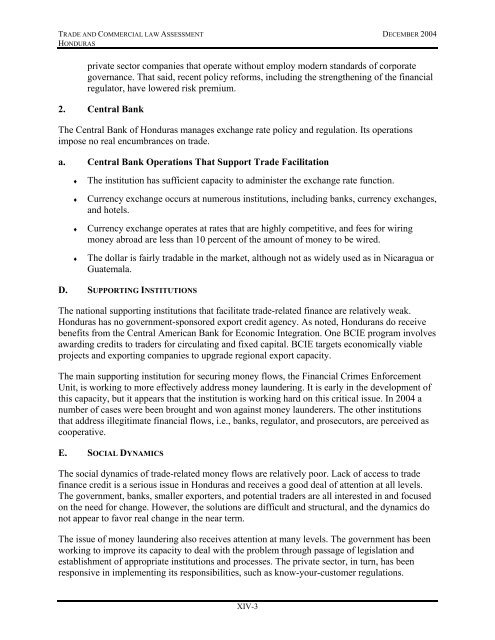Trade and Commercial Law Assessment - Honduras - Economic ...
Trade and Commercial Law Assessment - Honduras - Economic ...
Trade and Commercial Law Assessment - Honduras - Economic ...
Create successful ePaper yourself
Turn your PDF publications into a flip-book with our unique Google optimized e-Paper software.
TRADE AND COMMERCIAL LAW ASSESSMENT DECEMBER 2004<br />
HONDURAS<br />
2.<br />
private sector companies that operate without employ modern st<strong>and</strong>ards of corporate<br />
governance. That said, recent policy reforms, including the strengthening of the financial<br />
regulator, have lowered risk premium.<br />
The Central Bank of <strong>Honduras</strong> manages exchange rate policy <strong>and</strong> regulation. Its operations<br />
impose no real encumbrances on trade.<br />
a. Central Bank Operations That Support <strong>Trade</strong><br />
Facilitation<br />
♦ Currency exchange occurs at numerous institutions, including banks, currency exchanges,<br />
<strong>and</strong> hotels.<br />
♦ Currency exchange operates at rates<br />
that are highly competitive, <strong>and</strong> fees for wiring<br />
money abroad are less than 10 percent of the amount of money to be wired.<br />
♦ The dollar<br />
is fairly tradable in the market, although not as widely used as in Nicaragua or<br />
Guatemala.<br />
The national supporting institutions that facilitate trade-related finance are relatively weak.<br />
<strong>Honduras</strong> has no government-sponsored export credit agency. As noted, Hondurans do receive<br />
benefits from the Central American Bank for <strong>Economic</strong> Integration. One BCIE program involves<br />
awarding credits to traders for circulating <strong>and</strong> fixed capital. BCIE<br />
targets economically viable<br />
projects <strong>and</strong> exporting companies to upgrade regional export capacity.<br />
The main<br />
supporting institution for securing money flows, the Financial Crimes Enforcement<br />
Unit, is working to more effectively address money laundering. It is early in the development of<br />
this capacity, but it appears that the institution is working hard on this critical issue. In 2004 a<br />
number of cases were been brought <strong>and</strong> won against money launderers. The other institutions<br />
that address illegitimate financial flows, i.e., banks, regulator, <strong>and</strong> prosecutors, are perceived as<br />
cooperative. E.<br />
Central Bank<br />
♦ The institution has sufficient capacity to administer the exchange rate function.<br />
D. SUPPORTING INSTITUTIONS<br />
SOCIAL DYNAMICS<br />
The soc ial dynamics of trade-related money flows are relatively poor. Lack of access to trade<br />
finance credit is a serious issue in <strong>Honduras</strong> <strong>and</strong> receives a good deal of attention at<br />
all levels.<br />
The government, banks, smaller exporters, <strong>and</strong> potential<br />
traders are all interested in <strong>and</strong> focused<br />
on the need for change. However, the solutions are difficult<br />
<strong>and</strong> structural, <strong>and</strong> the dynamics do<br />
not appear to favor real change in the near term.<br />
The issue<br />
of money laundering also receives attention at many levels. The government has been<br />
working<br />
to improve its capacity to deal with the problem through passage of legislation <strong>and</strong><br />
establishment of appropriate institutions <strong>and</strong> processes. The private sector, in<br />
turn, has been<br />
responsive in implementing its responsibilities, such as know-your-customer regulations.<br />
XIV-3

















